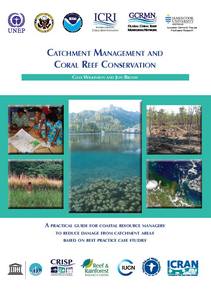Science-based catchment management is evolving along the Great Barrier Reef of Australia
Fabricius, Katharina, Brodie, Jon, Waterhouse, Jane, and Yorkston, Hugh (2011) Science-based catchment management is evolving along the Great Barrier Reef of Australia. In: Wilkinson, Clive, and Brodie, Jon, (eds.) Catchment Management and Coral Reef Convservation. Global Coral Reef Monitoring Network and Reef and Rainforest Research Centre, Townsville, QLD, Australia, pp. 102-105.
![[img]](https://researchonline.jcu.edu.au/20753/3.hassmallThumbnailVersion/20753_Fabricius_et_al_2011_Book_cover.jpg)
|
Image (JPEG) (Book cover)
- Cover Image
Download (123kB) |
|
|
PDF (Published Version)
- Published Version
Restricted to Repository staff only |
Abstract
The Great Barrier Reef (GBR) is the world's largest reef system (with about 12% of the world's coral reef area) and almost the whole area is covered by a multi-use marine park. About 33% of the Great Barrier Reef (GBR) is completely protected from fishing and exploitation. However, the GBR is particularly vulnerable to terrestrial runoff of sediments, nutrients and pesticides, especially from expanding and intensifying agriculture. The GBR is located on a shallow and wide continental shelf that traps incoming materials from 35 major river catchments along the more than 2300 km length. Therefore, reducing the damage coming from these catchments presented a particularly challenging task for management. The initial focus for management was to address the obvious direct inputs of pollutants from urban areas, such as discharges from sewage treatment plants, by regulating waste management facilities and establishing best practice standards. However, the science was beginning to identify that the discharges from agricultural lands into rivers was providing a far greater proportion of pollutants (more than 80%). Therefore, this task needed, and has since received, robust scientific evidence and strong public support to show that conservation of the GBR is important. However, there was vigorous debate until the early 2000s about whether river runoff was really a problem, and if it was, then what should be done to reduce the effects of terrestrial runoff on such a large system.
| Item ID: | 20753 |
|---|---|
| Item Type: | Book Chapter (Non-Commercial) |
| ISBN: | 978-0-642-32222-7 |
| Keywords: | Great Barrier Reef, sediments, nutrients, pesticides, agriculture |
| Date Deposited: | 17 Apr 2012 05:35 |
| FoR Codes: | 05 ENVIRONMENTAL SCIENCES > 0502 Environmental Science and Management > 050205 Environmental Management @ 100% |
| SEO Codes: | 96 ENVIRONMENT > 9606 Environmental and Natural Resource Evaluation > 960604 Environmental Management Systems @ 100% |
| Downloads: |
Total: 415 Last 12 Months: 4 |
| More Statistics |



